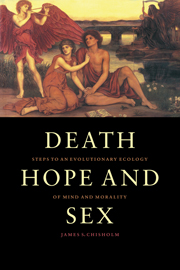4 - Representing value
Published online by Cambridge University Press: 02 December 2009
Summary
[T]he substitution of the reality principle for the pleasure principle implies no deposing of the pleasure principle, but only a safeguarding of it. A momentary pleasure, uncertain in its results, is given up, but only in order to gain along a new path an assured pleasure at a later time.
Sigmund Freud (1911/1956:223)Among personality processes, the most vulnerable seem to be those underlying the ability to establish and maintain deep and meaningful interpersonal relations, and the ability to control impulse in the interest of long-range goals.
Mary Ainsworth (1965:219)Some for the Glories of This World; and some
Sigh for the Prophet's Paradise to come;
Ah, take the Cash, and let the Credit go,
Nor heed the rumble of a distant drum!
Edward FitzGerald (1809–1883) (The Rubáiyát of Omar Khayyám)Up to now I have presented my life history model of attachment in straightforward biological terms. Adopting the adaptationist perspective I argued first that the attachment process is for gaining knowledge about environmental risk and uncertainty in order thereby to gauge one's reproductive value and to adopt the local optimal developmental strategy. Since development is ultimately for reproduction, a strategy for development is an incipient reproductive (i.e., life history) strategy. Approaching attachment from biology's mechanist viewpoint, I then did a quick reverse engineering analysis of the attachment process to suggest that children gain knowledge of local environmental risk and uncertainty and thus their reproductive value primarily through the effects of “psychobiological attunement” and mutual sensitivity, responsiveness, and acceptance (or the lack thereof) in repeated iterations of the attachment cycle.
- Type
- Chapter
- Information
- Death, Hope and SexSteps to an Evolutionary Ecology of Mind and Morality, pp. 118 - 148Publisher: Cambridge University PressPrint publication year: 1999



